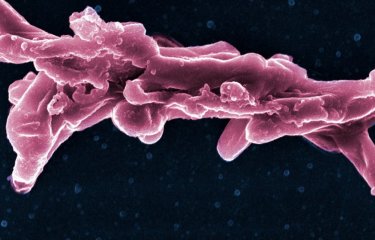As part of the video series "My PhD at the Institut Pasteur," which highlights the work of the institute’s PhD students through short and accessible formats, a new episode features Yaëlle Wormser, a doctoral student in microbiology. Through a powerful rap, she raises public awareness about her research on tuberculosis, an infectious disease responsible for over 10 million cases and 1.25 million deaths in 2023 (WHO).
Understanding tuberculosis through popularization
For many, tuberculosis may seem like a disease of the past, but it remains a very real threat, especially due to its antibiotic-resistant forms. To better communicate this issue, Yaëlle chose an original approach: rap. Through her lyrics, she highlights the goals of her thesis. Her aim? To better understand the molecular mechanisms of this disease to contribute to new treatments.
To achieve this, her laboratory uses a harmless bacterium, Corynebacterium glutamicum, as a model organism. It allows them to identify molecules that can target DNA gyrase — a key enzyme in Mycobacterium tuberculosis, the bacterium that causes tuberculosis.
The effects of these molecules are first observed by fluorescence microscopy. The most promising are then analyzed at the atomic scale using cryo-electron microscopy. This cutting-edge technique allows precise visualization of their mode of action, thus evaluating their potential against multi-drug resistant forms of the disease.
This popularization effort goes beyond explaining complex concepts: it also helps strengthen public trust in research while encouraging other PhD students to engage in creative formats.
This approach is all the more essential as tuberculosis today embodies one of the greatest challenges linked to antimicrobial resistance...
Antimicrobial resistance: tuberculosis on the front line
Yaëlle’s project fits within a broader context: the global fight against antimicrobial resistance (AMR), for which tuberculosis is one of the most alarming symbols. Too often overlooked, this disease has not disappeared and is even strengthening.
Despite progress made thanks to vaccines and antimicrobial treatments, diseases such as HIV/AIDS, tuberculosis, malaria, respiratory infections, and infectious diarrhea continue to cause millions of deaths each year.
Today, some strains of Mycobacterium tuberculosis no longer respond to standard treatments. This disease, already complex to treat, becomes even more daunting with the emergence of multi-drug resistant (MDR-TB) and extensively drug-resistant (XDR-TB) strains. In 2022, over 400,000 people developed rifampicin-resistant tuberculosis, a first-line antibiotic, with nearly half confirmed as multi-drug resistant cases (WHO). These resistant forms are much harder to treat, requiring long, costly, and often toxic therapies.
Today, tuberculosis alone accounts for one-third of deaths linked to resistant bacterial infections (WHO). This health crisis is worsened by unequal access to care, diagnostics, and new antibiotics, threatening to reverse decades of public health progress.
To support healthcare professionals and researchers in meeting these challenges, the Institut Pasteur offers dedicated tuberculosis trainings. Among them are an in-person Pasteur Course and a MOOC (Massive Open Online Course) to better understand antimicrobial resistance mechanisms and their consequences.
Communicating science differently: giving voice to young scientists
The "My PhD at the Institut Pasteur" project provides PhD students, who represent 25% of scientists on the Paris campus, with a platform to present their research. Through these scientific outreach initiatives, doctoral students develop essential transversal skills, especially in communication, enabling them to make science more accessible and foster constructive dialogue between science and society. This dual objective aligns perfectly with the priorities of the Institut Pasteur’s new strategic plan, Pasteur 2030.
In a context where misinformation weakens public trust in science, creative projects like Tuberkiller embody the Institut Pasteur’s commitment to open, creative, and engaging communication. Through an innovative artistic format, Yaëlle Wormser’s rap raises awareness of a still little-known public health issue: multi-drug resistant tuberculosis.
Tuberkiller fulfills an essential mission: sharing knowledge, raising public awareness, and reminding everyone of science’s vital role in combating global health threats. By promoting access to research through engaging formats, the Institut Pasteur fully embraces its role as a knowledge broker, ensuring science remains a reliable and motivating reference in public debate.
Original lyrics by Yaelle Wormser @Lady_Pipette
Music: Grind Mode - Nest Beatz
Mix & Master: Swann Camurat




